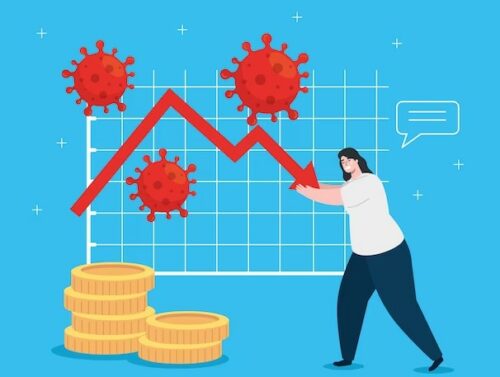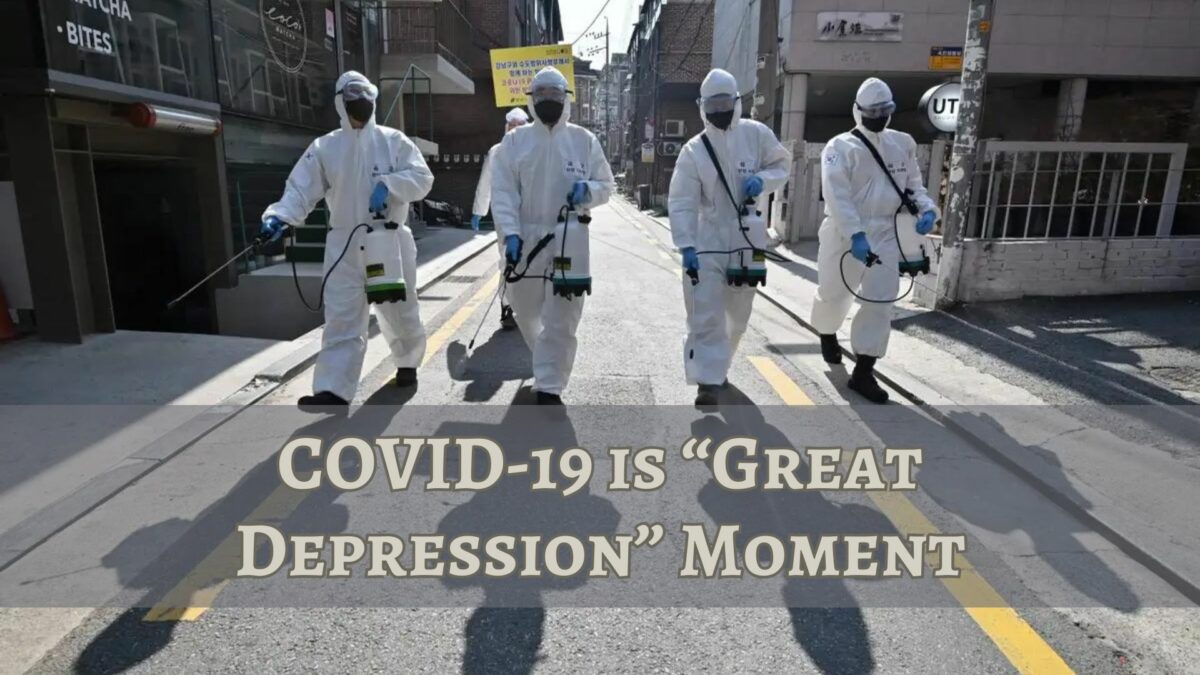This article is part of a series on personal finance during the coronavirus pandemic. Please check out the Coronavirus and Your Finances Series (link will open in a new window).
My mother lived through the Great Depression. Her family of 11 children pulled themselves up by their bootstraps and moved to wherever there was work at the time. And in rural Oklahoma, that wasn’t easy to find.
–Chuck Norris (COVID-19 doesn’t infect Chuck Norris; Chuck Norris infects COVID-19)
My grandparents grew up during the Great Depression. Two grew up on farms, and they eventually moved to the “big city” of Villa Rica, Georgia as a result. One grandparent had a father who was a ne’er-do-well who worked on the railroads and wasn’t home (or actually working) that much.
The Great Depression shaped how they lived the rest of their lives. My great grandmother would buy one share at a time of AFLAC stock whenever they got a check from my great grandfather from his railroad work. She held and never sold, and eventually bequeathed her grandkids six digits’ worth of stock. My maternal grandparents were very frugal and always paid cash for everything. They would tell stories about being on the farm and milking cows and growing their own food and reusing and repurposing everything. Some of that rubbed off on my mom, particularly when she was a single mother, as I remember having patches and holes in all of my clothes and shoes. I lived on a LOT of hand-me-downs growing up. Some of that was our situation, but some of that was the impressions that my grandparents made on my mother when she was growing up, and they were just coming out of World War II, finally starting to face the upside of the Great Depression.
Our generation talks about the dot com bubble, the 2008 crash, 9/11, and, for us Gen-Xers who remember, Black Monday of 1987.
But we’ve never faced a world-changing event like COVID-19.
It’s not going to be the earth decimating virus like Chuck Wendig wrote about in The Wanderers (#aff). However, because of the abrupt, sudden, and drastic changes that we’ve had to make to our lives, and, what I posit will be the long, slow rebound economically barring a drastic bending of the curve that we’re not seeing as of the time that I’m writing this (March 22, 2020), this will be an event that sticks out in our minds and changes our behaviors much more drastically than any of the other events that affected us.
Why Will We React Differently to COVID-19 Than We Did to 9/11, the Great Recession, and the Dot Com Bubble?

Because none of those events affected most people personally. Yes, we all saw the horrors of towers falling on 9/11. We know people who deployed and may know some people who were killed. However, few people actually deployed. Relatively few people lost their jobs. We saw it, but in a detached way. Even I, who had friends who were taking Saddam’s palace, heard only second-hand stories.
This one is different because we’re almost all experiencing changes in our lives as a result of the actions we need to take to bend the curve. As of March 21, 2020, one in four Americans is being asked to live under quarantine. There are few places in the United States where you could, if you wanted, go to a sit-down restaurant and eat a meal right now. Where we live, in Dallas, Texas, our county is threatening to ticket people who do not maintain six feet of distancing.
Because we’re all affected personally, our psychological reactions will be more akin to that of what our grandparents and great grandparents faced in the Great Depression. As the University of Chicago’s Jean Declety and Clauss Lamm explain, reactions and emotions that we experience as a result of personal experience are automatic and, generally, without self-reflection, while reactions and emotions that we experience as a result of empathy – seeing the experiences of others – come as a result of reflection and intentionality. In other words, personal experiences tend to generate more of a knee-jerk reaction as compared to thinking about the experiences of others and relating those experiences to how we react.
That’s why a lot of combat veterans, while appreciative of goodwill, will attest that unless you’ve been there, you really can’t know what it’s like.
In the case of our experiences and reactions to the novel coronavirus, we are almost all directly experiencing it, just like our ancestors did with the Great Depression.
These are the stories that we’ll tell our grandchildren, who will react to it similarly to how we reacted to our grandparents telling us about the Great Depression.
How Will Your Financial Behavior be Permanently Affected by the Coronavirus?

I don’t purport to know whether or not you’ll wash your hands for 20 seconds each time you come home two years from now.
It’s still hard to say, given that we’re probably still in the beginning phases of our national response to the coronavirus, how we’ll be permanently affected by it, but I can hazard some guesses.
- Conspicuous consumption will decrease. Given that we’re mostly staying at home and in self-isolation, nobody cares what we’re wearing right now. Nobody cares what cars we drive (even my beater car). Nobody cares how well we’ve styled our hair (particularly since, in many places, barber shops and hair salons have been closed through a mandate). We’ve also, hopefully, learned that none of those symbols of conspicuous consumption matter in our social constructs.
- People will keep bigger emergency funds, and financial planners will probably recommend 12-18 months of expenses in emergency funds rather than 6 months. When we FIREd (financial independence retire early), we had 18 months of expenses in cash and cash equivalents. At the time, our thinking was that the liquidity would provide a backstop in case our assumptions were wrong, and it did give us some extra dry powder to take advantage of good real estate investment opportunities. Now, it turns out to have been a godsend. Yes, because we REFIREd, our portfolio hasn’t been hammered too badly, but we’re in a position where we can sit, wait, and observe before making bigger decisions.
- This is the ultimate sequence of returns risk for those of us who FIREd this year. We have a couple of years’ worth of expenses liquid, and that’s before making any lifestyle changes. I wish we had a bunch of “back the truck up” capital! For now, hold. Reassess in 3-6 months.
- — Jason Hull, CFP® (@hull_j) March 18, 2020
- More people will have estate plans. According to the AARP in a 2017 survey, 60% of Americans do not have a will. Due to the high mortality and contagiousness of COVID-19, many more people will come to grips with their mortality than they did a priori. As a result, they will want to ensure that they performed appropriate estate planning.
- A greater appreciation of life and disability insurance. When you think you’re invincible, you don’t insure yourself. That’s why we rarely buy disability insurance. If we face a pandemic that fells the healthy as well as the infirm and compromised, we’ll start to question our invincibility. As a result, more people will look to get appropriate amounts of disability insurance and life insurance.
- More intentionality in spending. This is the effect of less conspicuous consumption. With all of this time at home, some people will engage in self-introspection to understand their priorities in life, which will lead to them valuing their time and money in a way that they did not do before.
- Less accumulation of debt. While it will take a while for people to work through the financial impacts of the novel coronavirus, once they do, they will probably stop taking on as much consumer debt. Did your grandparents ever use credit cards? Mine did not. This lesson may be burned into our generations as well, and some may even join the no debt bandwagon.
Eventually, the lessons of COVID-19 will be forgotten. However, I posit that, for many of, that forgetfulness will likely be because of old age rather than enough time passing.
How do you think your financial behaviors will permanently change? Let’s talk about it in the comments below!
Author Profile
- John Davis is a nationally recognized expert on credit reporting, credit scoring, and identity theft. He has written four books about his expertise in the field and has been featured extensively in numerous media outlets such as The Wall Street Journal, The Washington Post, CNN, CBS News, CNBC, Fox Business, and many more. With over 20 years of experience helping consumers understand their credit and identity protection rights, John is passionate about empowering people to take control of their finances. He works with financial institutions to develop consumer-friendly policies that promote financial literacy and responsible borrowing habits.
Latest entries
 Low Income GrantsSeptember 25, 2023How to Get a Free Government Phone: A Step-by-Step Guide
Low Income GrantsSeptember 25, 2023How to Get a Free Government Phone: A Step-by-Step Guide Low Income GrantsSeptember 25, 2023Dental Charities That Help With Dental Costs
Low Income GrantsSeptember 25, 2023Dental Charities That Help With Dental Costs Low Income GrantsSeptember 25, 2023Low-Cost Hearing Aids for Seniors: A Comprehensive Guide
Low Income GrantsSeptember 25, 2023Low-Cost Hearing Aids for Seniors: A Comprehensive Guide Low Income GrantsSeptember 25, 2023Second Chance Apartments that Accept Evictions: A Comprehensive Guide
Low Income GrantsSeptember 25, 2023Second Chance Apartments that Accept Evictions: A Comprehensive Guide

